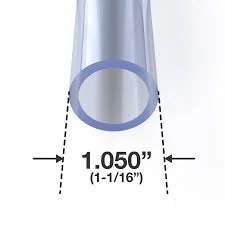វិច្ឆិកា . 11, 2024 07:22 Back to list
hdpe coil pipe
HDPE Coil Pipe An Overview
High-Density Polyethylene (HDPE) coil pipe has become a popular choice in various industries due to its unique properties and versatility. This type of pipe is manufactured from HDPE resin, a thermoplastic polymer known for its high strength-to-density ratio. It offers a robust solution for many applications, including water distribution, irrigation, drainage, and gas delivery systems.
What is HDPE Coil Pipe?
HDPE coil pipe is simply a flexible pipe made from HDPE. Unlike standard rigid pipes, this coil pipe is produced in long lengths and can be easily rolled up for storage or transport. The coiled design reduces the number of joints and fittings required for installation, making it a preferable choice in many cases. This adds to its durability and reliability in various applications.
Advantages of HDPE Coil Pipe
1. Flexibility One of the most significant advantages of HDPE coil pipes is their flexibility. This characteristic allows for easier installation around obstacles, making it ideal for situations where traditional rigid pipelines would be difficult to fit.
2. Corrosion Resistance HDPE is resistant to a wide range of chemicals and is unaffected by corrosive materials. This attribute extends the lifespan of the pipe significantly compared to metal pipes, which can corrode and lead to leaks over time.
3. Lightweight The lightweight nature of HDPE coil pipe makes it easier to handle and install. Workers can move the coils with ease, reducing labor costs and time required for installation.
4. Low Friction Coefficient HDPE has a low friction coefficient, which facilitates smooth fluid flow. This property helps in energy savings, as pumps require less energy to move fluids through HDPE pipes compared to other materials.
5. Environmental Impact HDPE is recyclable, which positively contributes to environmental sustainability. Many manufacturers create HDPE products from recycled plastics, further reducing waste.
6. Cost-Effective Although the initial investment in HDPE coil pipe may be higher than some traditional materials, its durability, low maintenance costs, and longevity make it a cost-effective choice over time.
hdpe coil pipe

Applications of HDPE Coil Pipe
The versatility of HDPE coil pipe allows it to be used in various applications
- Water Supply and Distribution HDPE coil pipes are widely used for potable water supply systems. Their resistance to corrosion and ability to handle high pressure make them ideal for transporting clean water.
- Irrigation Systems Farmers use HDPE coil pipes in irrigation systems due to their flexibility and durability. They can be easily laid out in the field, making them excellent for both surface and subsurface irrigation methods.
- Sewage and Drainage The non-corrosive nature of HDPE makes it a suitable option for sewage and drainage systems. It can effectively handle waste materials without degrading over time.
- Gas Distribution HDPE coil pipes are now also being used in natural gas distribution systems. They are classified as a safe and reliable method for transporting gas due to their resistance to environmental stress cracking.
Installation Considerations
While installing HDPE coil pipe, several factors should be considered to ensure a successful project. The pipe should be laid on a stable and smooth surface to avoid damage. Proper fittings and connections are crucial to prevent leaks, and it's vital to comply with local regulations for the specific applications.
Conclusion
HDPE coil pipe is an innovative solution that combines flexibility, durability, and cost-effectiveness, making it an invaluable asset in numerous applications. Its resistance to corrosion, chemical factors, and ease of installation further enhance its appeal to various sectors, from agriculture to construction. As industries continue to seek sustainable and efficient alternatives, HDPE coil pipe is expected to play a significant role in shaping the future of piped systems worldwide. As technology advances, it is likely that we will see even more innovative applications arise, leveraging the many benefits that HDPE has to offer.
-
Durable PP Rigid Sheet: Lightweight, Chemical Resistant Solutions
NewsAug.21,2025
-
PVC Grey Sheet for Extraction: Chemical Resistant & Durable
NewsAug.19,2025
-
Durable PVC Pipe Fittings for Plumbing & Irrigation Needs
NewsAug.18,2025
-
HDPE Steel Belt Reinforced Spiral Corrugated Pipe | High Strength
NewsAug.17,2025
-
HDPE Pipe Fittings: Durable, Leak-Proof Solutions
NewsAug.16,2025
-
Premium CPVC Sheet: High-Temp & Chemical Resistant Solutions
NewsAug.15,2025

